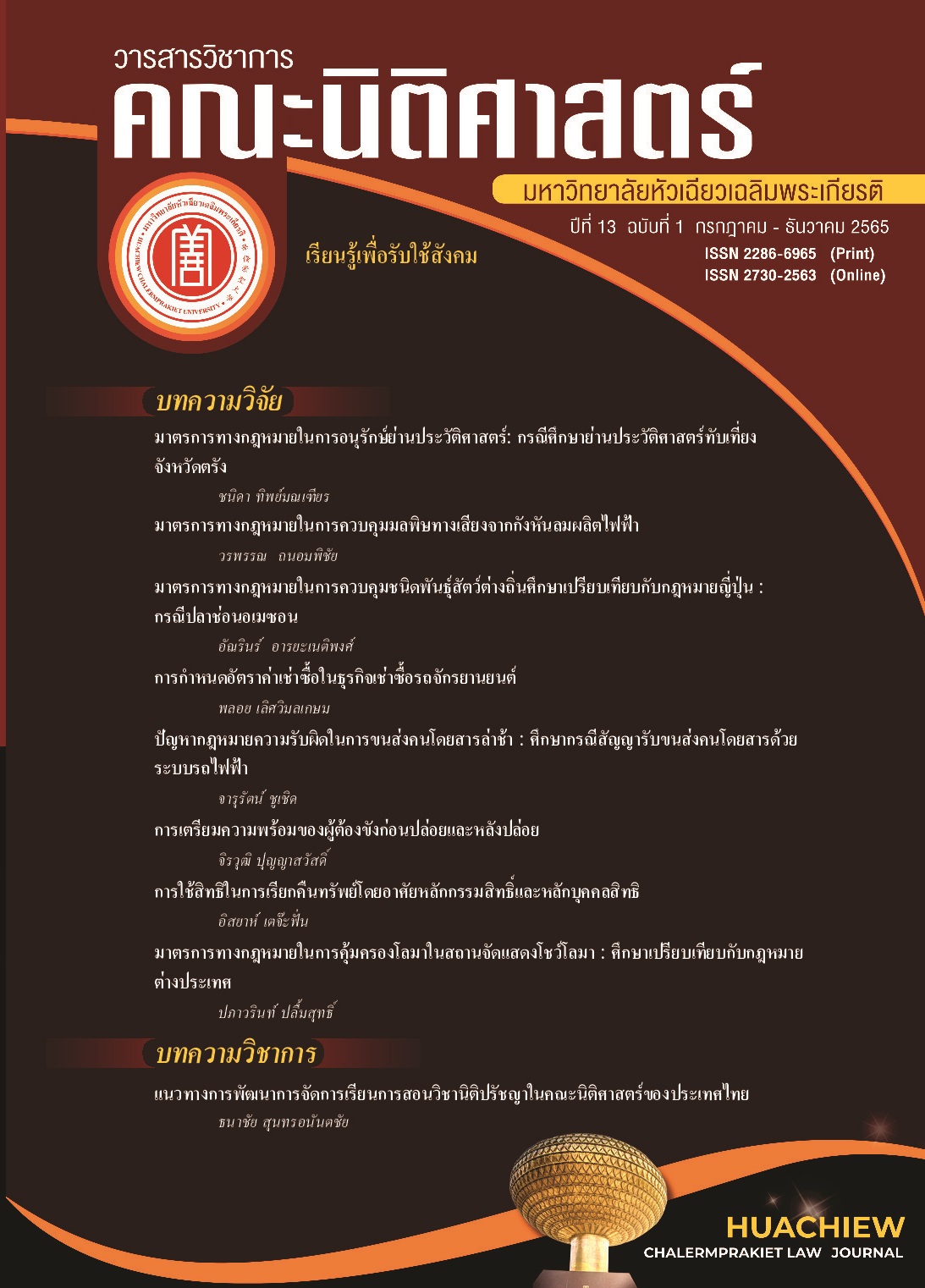มาตรการทางกฎหมายในการอนุรักษ์ย่านประวัติศาสตร์: กรณีศึกษาย่านประวัติศาสตร์ทับเที่ยง จังหวัดตรัง
คำสำคัญ:
มรดกทางวัฒนธรรม, ย่านประวัติศาสตร์, ทับเที่ยงบทคัดย่อ
งานวิจัยฉบับนี้มีวัตถุประสงค์เพื่อศึกษามาตรการทางกฎหมายที่เกี่ยวข้องกับการอนุรักษ์ย่านประวัติศาสตร์ โดยได้ศึกษาแนวทางในการอนุรักษ์ย่านประวัติศาสตร์จากมาตรการทางกฎหมายของประเทศญี่ปุ่น เพื่อนำมาเป็นแนวทางในการปรับปรุงมาตรการทางกฎหมายของประเทศไทยให้มีความเหมาะสมในการที่จะให้ความคุ้มครองแก่ย่านประวัติศาสตร์
จากการศึกษาพบว่า มาตรการทางกฎหมายของประเทศไทยในปัจจุบันยังคงเน้นการอนุรักษ์เฉพาะโบราณสถาน และอาคารที่เป็นของหน่วยงานของราชการ และจะให้อนุรักษ์เพียงแค่ตัวอาคารใดอาคารหนึ่งเป็นการเฉพาะเท่านั้นหรือโบราณสถานแห่งใดแห่งหนึ่งที่มิได้มีผู้คนอยู่อาศัยแล้ว แต่ย่านประวัติศาสตร์นั้นมีความแตกต่างจากโบราณสถานที่ไม่มีคนอยู่อาศัย เนื่องจากว่าย่านประวัติศาสตร์เป็นพื้นที่ที่มีคนอยู่อาศัย มีวิถีชีวิต และรูปแบบของสถาปัตยกรรมที่สามารถสะท้อนให้เห็นถึงการเปลี่ยนแปลง อีกทั้งยังมีความเป็นพลวัตสูง นอกจากนี้อาคารส่วนใหญ่ในย่านประวัติศาสตร์นั้นเป็นอาคารของเอกชน
ดังนั้น เพื่อให้การดำเนินการในด้านการอนุรักษ์ย่านประวัติศาสตร์เป็นไปอย่างมีประสิทธิภาพ ควรมีการกำหนดเขตเพื่อการอนุรักษ์อาคารหรือสิ่งปลูกสร้างเป็นกลุ่มอาคารหรือย่าน ๆ หนึ่ง และควรลดมาตรการในเชิงบังคับ แต่เป็นการเพิ่มมาตรการในการจูงใจให้เจ้าของอาคารหรือสิ่งปลูกสร้างหันมาให้ความร่วมมือในการที่จะอนุรักษ์และดูแลอาคารหรือสิ่งปลูกสร้าง
เอกสารอ้างอิง
2. ปัทม์ วงศ์ประดิษฐ์, การศึกษาพัฒนาการรูปแบบของตึกแถวจังหวัดตรัง (ศิลปศาสตรมหาบัณฑิต, คณะ สถาปัตยกรรมศาสตร์ มหาวิทยาลัยศิลปากร, 2557).
3. ยศศักดิ์ โกไศยกานนท์, กฎหมายคุ้มครองมรดกภูมิปัญญาทางวัฒนธรรม (กรุงเทพฯ: วิญญูชน, 2559).
ดาวน์โหลด
เผยแพร่แล้ว
รูปแบบการอ้างอิง
ฉบับ
ประเภทบทความ
สัญญาอนุญาต
ลิขสิทธิ์ (c) 2022 วารสารวิชาการคณะนิติศาสตร์ มหาวิทยาลัยหัวเฉียวเฉลิมพระเกียรติ

อนุญาตภายใต้เงื่อนไข Creative Commons Attribution-NonCommercial-NoDerivatives 4.0 International License.
บทความหรือข้อความคิดเห็นใด ๆ ที่ปรากฏในวารสารฉบับนี้เป็นวรรณกรรมของผู้เขียนโดยเฉพาะ คณะนิติศาสตร์มหาวิทยาลัยหัวเฉียวเฉลิมพระเกียรติ และกองบรรณาธิการไม่มีส่วนรับผิดชอบหรือไม่จำเป็นต้องเห็นด้วยกับข้อคิดเห็นนั้น แต่ประการใด








